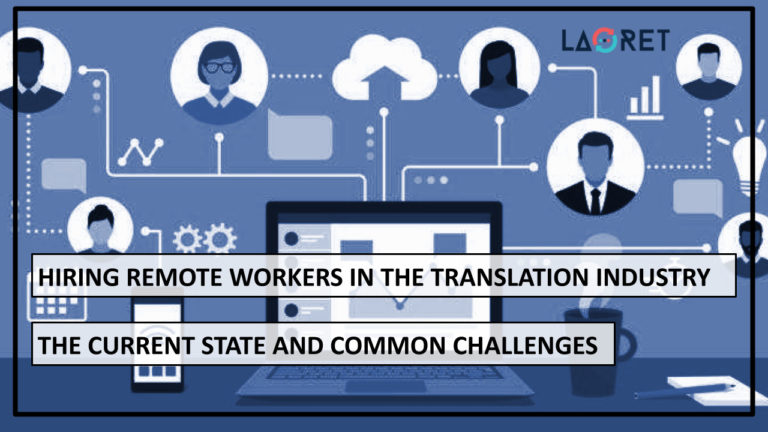Hiring Remote Workers In The Translation Industry: The Current State And Common Challenges
The global workplace is changing. We have all been affected by the abrupt implementation of the “new normal†and remote work has become the new norm. But what does that mean for the Translation & Localization Industry? How do Language Service Providers (LSP) curb these changes and what are the common challenges that are met along the way?
Introducing our first part in a series on remote work and hiring in the Translation World. In this part, we will focus on the state of the industry, its ability to adapt to remote work, and the common challenges faced when hiring remote workers.
Remote Work In The Language Service Industry: A Second Nature
According to a 2019 report by Nimdzi,1 we can see that even before the pandemic banished a large number of workers to the home office, over 30% of language services professionals already worked remotely full-time. If we choose to include the professionals who work remotely on a part-time basis, more than 68% worked remotely some of the time.
LSPs have always set the bar for multidisciplinary and multicultural teams where culturally varied experts are expected to work together efficiently. What lies ahead for the LSPs now is to further mitigate the changes and commit to continuous education and training, often at a higher rate, and to further tighten the recruitment process to meet an increasingly remote world.
The recent developments in global health, for example, have forced many businesses to consider alternate approaches to traditional models, including the language industry. Interpreting services, which are both available on-site and increasingly remote, have suddenly created a need for a small revolution within the virtual capabilities of the industry. And LSPs were able to meet these quite effectively.
Pro Tip! Learn more about how tools and technologies had to meet a demand for remote services in our blog on Virtual Interpreting: a complete guide to the best practices.

Why Remote? Because Authenticity Matters
When looking at the graph below, some spikes can be very telling. The highest one is the linguists and their tendency to work remotely. This communicates with a standard practice set in place in order to meet linguistic standards head-on by hiring local experts exclusively.
Since not only the language but also the culture, the marketing message, and local sensitivities need to be considered, the linguist must be located in the targeted region. This way, they can:
- Keep up to date with the linguistic and cultural developments of the language and region they are translating for.
- Maintain a full immersion status and truly understand the mindset of the clients. With this also comes the ability to integrate various and trendy cultural concepts and maintain the same integrity of the source text.
- This should be combined with subject-matter expertise that ensures technically-precise implementation of the translation.
Technological Innovation Lies At The Heart Of The Language Industry
In order to offer clients a personalized service tailored to their project needs, the top-of-the-line LSPs utilize localization tools including Translation (CAT) tool and Translation Management System (TMS). But these systems also go beyond quality of work. They connect the Project Managers, linguists, and localization engineers, no matter where they are located. For this, the TMS is leveraged to:
- Synchronize the workflow between translators, editors, and proofreaders
- Keep client information and requests in one place
- Integrate Translation Memory (TM), Glossaries, and Style Guides, so accuracy, consistency, and efficiency can be maintained for any current and future projects
- Make it possible to integrate specialized Desktop Publishing (DTP)-Toolkits and Localization Engineering tools
- Optimize feedback procedures and project evaluation

Even with these technologies in place, the remote staff itself will still need to adopt and cultivate certain traits that will make sure this technology is used to its maximum potential and with the best outcome for the clients in mind. This includes stellar communication skills, proactively maintaining a bond and work culture, and safeguarding the delicate work/home balance.
What else is on that list? Let’s dig into that now.
Challenges Of Hiring Remote Workers: The Big Picture
The Translation and Localization Industry may be particularly geared towards remote work, but the challenges in hiring quality remote workers do transcend the industry itself.
The 2020 New World of Work report by Workable2 highlights the results are taken from a survey that collected information on remote hiring behavior in employers and what they are looking for in an employee once the switch to remote work had become a reality for so many of them.
While much of the data reflects the difficulties of the shift to remote work due to the pandemic, we have found that these challenges usually remain the same throughout a remote career in any timeframe.

When it comes to challenges in hiring remote workers, the company side and the worker both reflect unique challenges. According to the study, the employer finds it challenging to source, evaluate, on-board, and engage remote workers. In industries outside of the Translation World, the employee’s ability to function in a virtual world of recruiting and HR where they essentially have to relearn a portion of their jobs, adaptability is listed as the most important trait for a remote worker to have.
However, this does not mean that every employee in the Language Services Industry is hugely adaptable by default. With the industry geared towards performance on a tight schedule and constant change depending on market values, client needs, and how the business world evolves, adaptability simply comes with the territory. And this makes the challenge even greater.
The Top Qualities Each Remote Worker Should Have
While part two of this blog will focus on the individual hiring qualities of specific positions held in the translation industry, there are common traits each and every remote worker should possess.

But here’s the rub. How can you make sure a candidate has these qualities? After all, the interview process isn’t always a prelude to the actual work a candidate will be able to do, it can also be a bit of a performance. And since remote workers should have traits that can’t easily be demonstrated on the spot but will rather show in the work itself, the hiring challenge increases.
Let us have a quick look at the top 3 desired traits:
- Adaptability matters greatly for the language industry in that it is not only largely remote work, it is also subject to great change depending on the global business landscape and new technologies to which the translations will always need to adapt to. When testing a candidate for adaptability, do not stick to general questions. Create a scenario that applies to the job at hand and see how they would go about solving very specific issues on the moment itself. For example, they are asked by their manager to create an incident report of translation or communication errors with clients and are expected to deliver on the same day. How do they manage this while not falling behind on other tasks?
- Self-motivation is another key trait each remote worker in the Translation Industry should have. With no one looking over their shoulder, they will still need to perform. How do you know beforehand if a candidate may or may not possess this quality? For this, allow more than one person, perhaps even from different departments, to conduct an interview or be part of it. Ask questions that focus on what success means to them and what they didn’t enjoy about particular jobs. Self-motivation is often lost when confronted with a work environment that simply doesn’t suit them. So, listen closely to any negative experiences that communicate strongly with the role they are applying for. These are red flags.
- A willingness to grow is often reflected in how the candidate was open to taking on new responsibilities when their job description actually didn’t call for it, or if they had taken any courses in order to improve their skills. These things are easier to pick up on, so make sure this is a quality each candidate can demonstrate. With the translation industry often changing in order to meet current trends, this willingness to grow is absolutely essential.
Conclusion
Now that you have a general idea of how the language industry has positioned itself within a remote environment and are aware of the most pressing qualities to look out for that apply to each member of your team, you can go deeper.
That is why at Laoret, we hire in-country, native professionals who possess targeted subject matter expertise. We leverage the latest translation technologies to ensure translation quality as well as speed and apply rigorous QA on every level. Contact us and get a free quote for your next localization project and take the first step in developing a localization business strategy!






